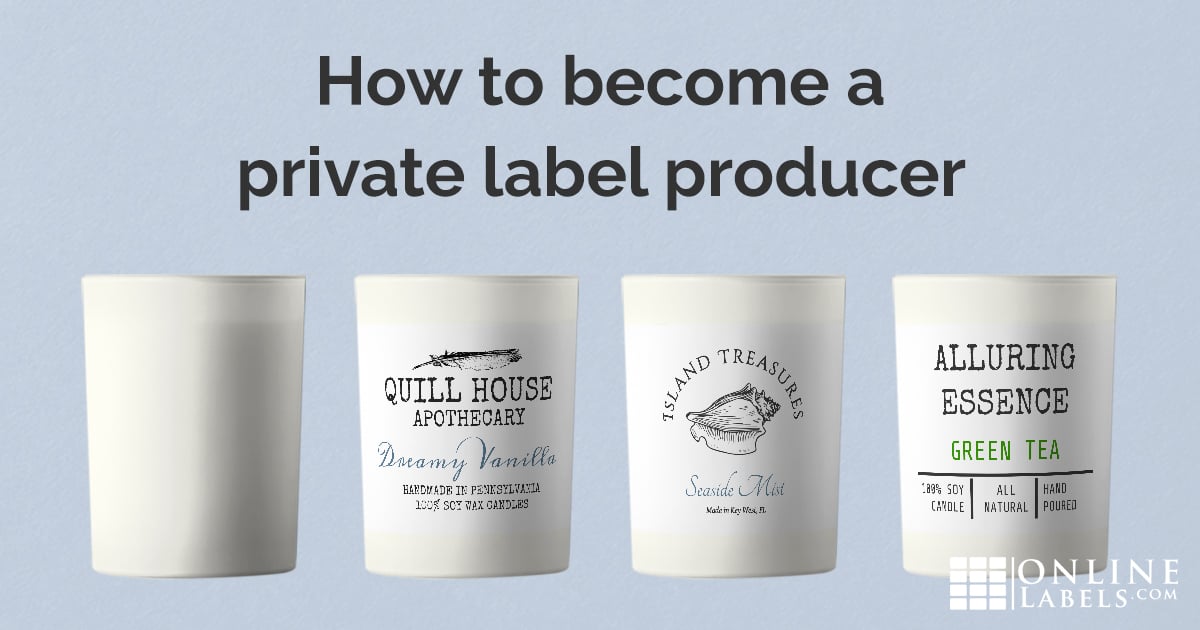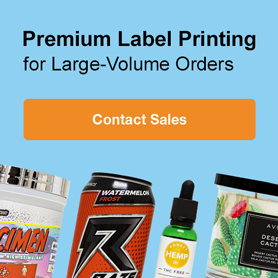Selling Your Products For Private Labeling

One way to increase revenue and growth is to shrink your B2C channel and sell your products to other businesses instead. This process of private labeling is a common and accepted business practice. It occurs in nearly every industry – from cosmetics to cars.
You may be familiar with the concept as it relates to items at the grocery store. Popular examples include Walmart's Great Value brand and Target's Up & Up.
Wondering how it works and why you might want to fund a competitor? Stick with us as we break down the answers to those two big questions (and more) below.
What is private labeling?
Also known as "white labeling," to private label means to pay another company to manufacture their product for resale under your name. Thus, the product maker operates completely behind the scenes and the final seller doesn't have to create a product from scratch. This would be the role of your company.
Your customer (the buyer of the white label goods) is who functions in the public eye – doing all the branding, marketing, retailing, and selling. More interested in this aspect, selling someone else's product as your own? Learn more about starting a business using private label products.
Is offering private label service a good idea for my business?
White labeling is an attractive business proposition for a number of reasons - many of which coincide with wholesaling. Producing and selling in bulk is faster than selling smaller batches and the buyer takes on the responsibility of moving inventory.
ROYCE New York has been private labeling for more than 60 years. Owner William Bauer verifies that for them, B2B is preferable to B2C. "Private label has been a much easier business to handle, as there is very little marketing and business development involved," says Bauer. "Furthermore, the order volume is high and we're able to achieve economies of scale."
Another fact is that product quality and production take time. For businesses that have already perfected that process, white labeling is an easy way to make money. Bauer shares that their customers are "Department stores as well as brands that wanted to diversify their product offering in categories that they didn't necessarily deem to be a core competency of theirs."
If you, too, have expensive machinery or technology, private labeling is a way to capitalize on those assets. Take it from Cameron Pullano, part of the team at Halo Labs:
"We became involved in white labeling because we understand that extraction equipment can be expensive for smaller cannabis companies to invest in. We found it was a great way to increase returns on our investments in novel manufacturing processes."
If your factory isn't running at max capacity or shuts down at night, continue monetizing that. El Guapo CEO Christa Cotton talks about how white labeling was a smart financial move after increasing their production capacity:
"We started taking on more private clients after moving into a larger facility in 2019" says Cotton. "It's an economical way for us to fill idle time in our manufacturing schedule."
Other companies use the power of private labeling simply to grow faster. "While selling our products directly to small and medium-sized businesses, we realized that to quickly scale, we needed to get our products in front of more businesses in the most efficient manner possible," explains Matthew White, CEO of Qebot.
"We developed a white label version of our technology that private labels could rebrand as their own product and resell. With our revenue share model in place, companies can turn on our platform for their brand, start selling new products and services, and simply collect the revenue share checks month to month with zero upfront investment."
Much like Qebot, Traverse Bay Farms saw a direct upside to selling white label products. "The benefit to private labeling is it provides cash flow to fund operations and growth," shares Andy LaPointe, Director of Marketing.
Is there risk with white labeling?
White labeling can be unpredictable and potentially limit your growth opportunities, especially if you're trying to brand and sell your own products as well.
What if your buyer outgrows their need for you? Say they make enough to manufacture their own product and continue to sell it under the brand they established while selling yours. Your large orders and cash flow cease and nobody knows any wiser – it's as if you never even existed.
It's important to weigh that risk before starting, and diversify your client base so one lost client doesn't destroy what you've built.
As with any business, you should meet with legal counsel to make sure you have solid agreements in place and that your business is protected. Check out our legal article series for tips or contact veteran trademark and patent attorney, Nick Guinn of Gunn, Lee & Cave, PC.
And yet, companies around the world continue to produce white label goods. Here's what Condo Wizard Co-Founder Tal Shalef has to say about it: "As long as there are companies that need a service and a no-brand product, my business will continuously run. Some businesses don't want to spend a lot of time designing and planning a product and it will make my business more active by having agreements with private businesses."
What makes a good white label seller?
White label buyers are looking for a reliable product that requires minimal effort and can save them development and manufacturing expenses. Keep your deliveries on schedule, be available for contact when they need you, and continue to produce a quality product. You may not be putting your name on it, but your partners are.
How do you find private label buyers?
As with any partnership, the most important factor is finding the right partner, or better yet, having them find you. Sellers looking for white label products often turn to the internet to find suppliers for the products they wish to market.
Make sure your website is optimized for the phrases "white label" or "private label," coupled with keywords based on the product(s) you manufacture. You want to come up on the first few pages in Google for the search term as a whole (example: white label candles).
Another way to find buyers for your white label products is to attend industry tradeshows. You can find information on upcoming trade shows with a simple Google search.
In both cases, be sure to highlight your company's regulatory and compliance processes, certifications, and/or ingredients. Point out anything that sets your products apart or may be ideal to a niche buyer. This could convince them to purchase from you instead of another seller and gives them selling points in their own marketing.
Exactus, Inc. understands that better than anyone. Take a look at their sales pitch: "White label clients can build confidence in their brand and accelerate time to market by offering quality finished products formulated with our USDA compliant CBD and CBG ingredients."
But perhaps the easiest way of all to acquire private label business is to listen:
"We decided we should probably sell products for white labeling simply because we received so many emails asking for advice about this" says Finn Hayden of CBD Bible. "It was clear to us that there was a massive need for a reliable white label service within our industry."
What should you look for in a white label buyer?
When seeking out sales partners for your products, here are a few items to think about.
- Market Access. A good partner is one who has an established reputation and access to the market you're trying to reach. Having said that, small buyers are a great way to get started and experience serving them may be required to land a big fish.
- Competition. If you are selling under your own name too, you want to find partners who operate in complementary markets and not competitive ones.
- Order Volume. It's a great problem to have, but being blindsided by a massive order can drown a small business. If you're not physically or financially ready to fulfill large orders, be honest with the buyer. This is predominantly directed toward people hand-making products.
- Return Policy. Make sure your policy on returns is spelled out clearly because many chain retailers promise "no questions asked" return policies and leave the financial burden on their manufacturing partners.
- Payment Terms. When orders are shipping out with invoices payable in 90 days but your bills are due on-the-spot, you might find yourself in a tough financial situation. Learn more about Net business accounts.
What happens next?
Once you have companies interested in purchasing a white label version of your product, you manufacture the order on their behalf. Depending on the size of your (and their) operation, you can sell the product unbranded or finish the product with their logo/packaging.
You can charge different amounts based on which option you provide. In either scenario, this is where you make a profit. You can charge more per unit than it costs, and complete large orders without having to sell your product individually to customers. That results in marketing, shipping, and time savings.
Keep OnlineLabels.com in mind when it comes to product labeling and shipping. Whether it's under your own name or someone else's, we offer the label sizes and configurations you need to run your business.
White labeling can allow you to spend more time focusing on your core competencies, get to market faster, and reach markets you never even knew existed with dramatically reduced marketing and sales expenses. But it's not for everyone. We hope this article helped you come to a decision on whether or not white labeling is right for you and your business.
Need product labels? Shop premium label solutions for high-end labels and large quantity orders, or fill out the form below:



